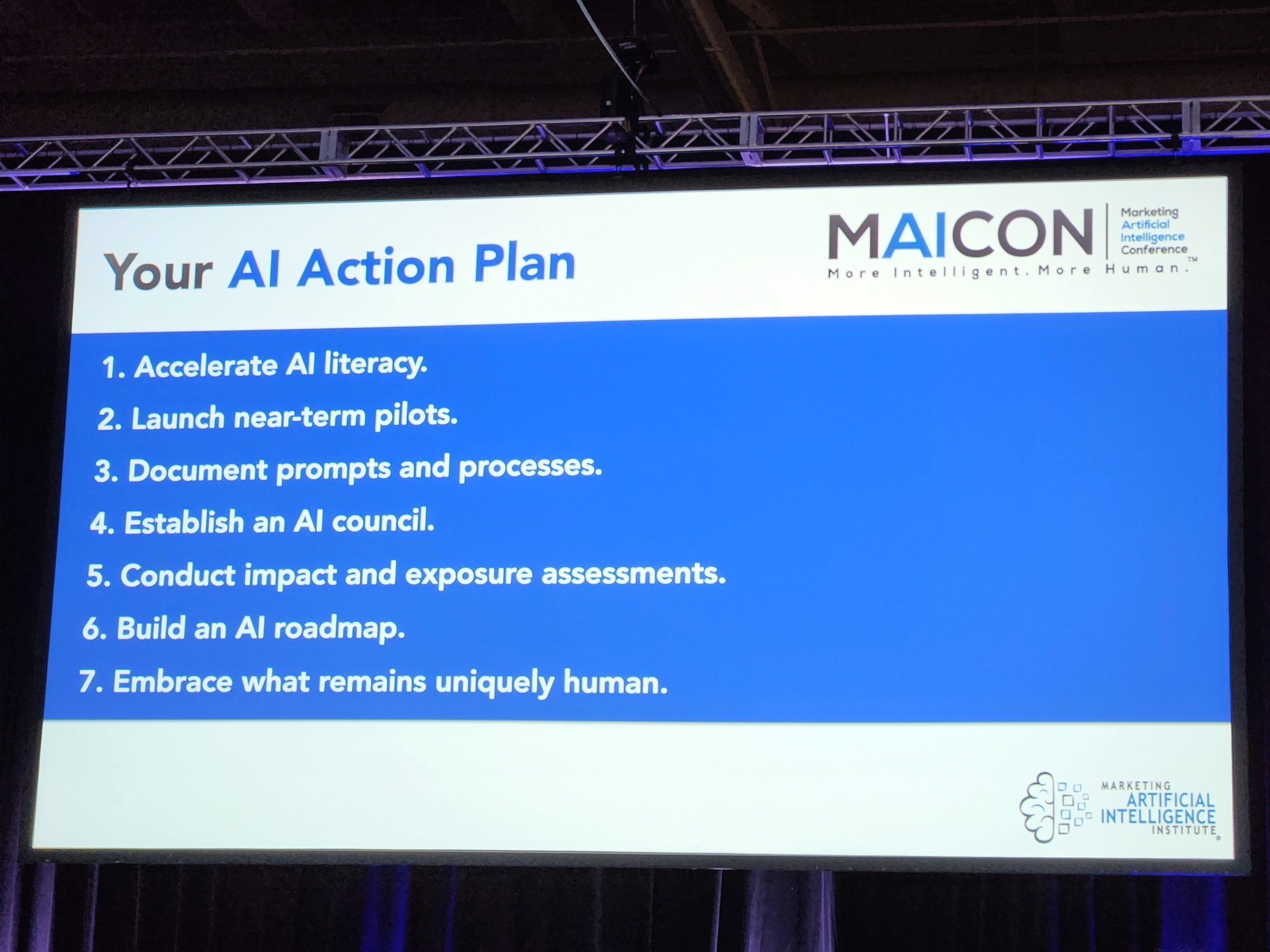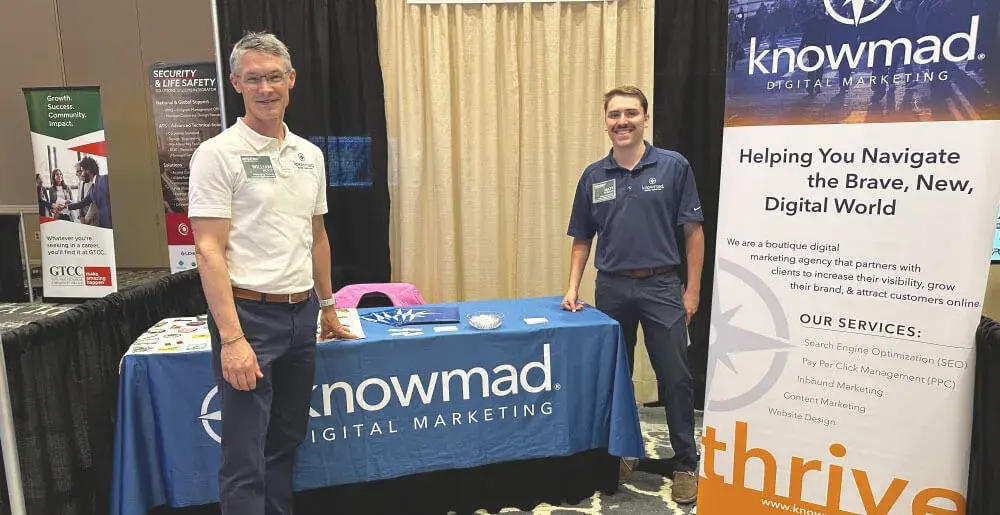author
William McKee
Now in its fifth year, the 2024 Marketing AI Conference (MAICON) drew over 1,100 attendees to Cleveland, highlighting the growing impact of AI in marketing. This year's theme focused on transitioning from piloting AI to accelerating AI literacy, adoption, and usage.
MAICON's programming is designed for marketing and business leaders and practitioners interested in AI applications within their jobs, businesses, and industries. You don't need a background in analytics, data science, or programming to benefit—just a willingness to learn and experiment with this transformative technology.
The Modern Marketer: Embracing AI for Strategic Advantage
 Similar to past MAICON events, the focus of the 2024 event was on AI literacy and speeding up the integration of AI into our businesses. And, I appreciate that the event organizers emphasize both the technological as well as the human element, which is evidenced in the tagline - "More Intelligent, More Human."
Similar to past MAICON events, the focus of the 2024 event was on AI literacy and speeding up the integration of AI into our businesses. And, I appreciate that the event organizers emphasize both the technological as well as the human element, which is evidenced in the tagline - "More Intelligent, More Human."
This theme of focusing on the humans-in-the-loop was prevalent in many of the presentations. Here are highlights from a few of the sessions that I attended during the 3-day event:
- Jim Sterne led a half-day workshop on integrating GenAI into our organizations that dove deep into the roles of an internal AI Council and how to use this structure to expand AI literacy, usage, and benefits throughout an organization.
- In his opening keynote, Paul Roetzer explored what skills/talents remain uniquely human, even as AI continues to advance. He also spoke about unlocking human potential, not replacing it.
- Andrew Davis introduced Digital Doppelgängers and motivated the audience to embrace AI as a colleague. (Drewdini has become a frequent penpal for me).
- Yash Gad and Christopher Penn encouraged us to explore custom and open language models as a way of stimulating innovation.
- Liz Grennan leaned into building digital trust and emboldened us to go fast, be innovative.
- Futurist, Mike Walsh, spoke about the Fifth Industrial Revolution while imploring the audience to think about building platforms, not products, that create transformative experiences for our customers & employees.
- Andy Sacks and Adam Brotman shared the lessons they are learning along their AI Journey (also a forthcoming book).
- Jessica Hreha inspired us to create a sense of urgency for AI literacy on our teams and the importance that good managers have in successful adoption.
- Katie Robbert shared the Trust+Insight team's 5P framework to focus AI efforts.
- Wil Reynolds had the audience laughing as he got real about what's happening with SEO and content marketing.
- Keith Moerhing gave away a wealth of knowledge and sample code in his session on making your own AI-powered automations.
- And, to cap things off, OpenAI announced the release of the much-rumored OpenAI “Strawberry” enhanced reasoning system just as Paul and Mike were getting ready for their closing remarks. The guys did some quick analysis and provided the attendees with early insights into this next generation of AI.
Insights from the AI Frontier: Goals, Reflections, and Learnings
My objectives going into the event were fourfold:
- Gain insight into AI advancements over the next 1-3 years
- Explore ways to deploy AI into the agency (aka, AI Ops)
- Look for opportunities to add new AI-enabled services
- Identify the next tool to build.
As in previous years, I was thoroughly impressed by the content, speakers, and connections I established. The community that is building around this event is very collaborative and open to new ideas. As a participant, it feels like the early days of HubSpot's Inbound conference.
This year, I captured the following takeaways from the event:
- The success of AI integrations depend on people.
- AI adoption requires a shift in the culture of a business (referred to as becoming an AI-emergent business).
- Businesses will employ multiple models—adaptability to change is crucial as platforms continue to evolve.
- AI industry leaders do not fully know how this technology works or where it is leading us, but they are pursuing it at speed.
- The pursuit of AI, while promising, requires a balance of enthusiasm and caution to ensure the benefits outweigh the risks.
As in 2023, successful AI integration continues to hinge on people. This can be evidenced in several of the quotes that I captured:
- Paul Roetzer, Marketing AI Institute: "The goal for AI should be to unlock human potential, not replace it."
- Katie Robbert, Trust+Insight: "New technology does not solve old problems."
- Liza Adams, GrowthPath Partners: "AI favors the intensely curious."
- Mike Walsh, Tomorrow.io: "What is the true potential of human leadership in the 21st century?"
- Jessica Hreha, Jasper: "You do not have to be an AI expert. You just have to take action."
Building an AI-Powered Marketing Approach: Playbooks, Patchworks, and frameworks
Building an AI-powered marketing approach involves selecting the right tools and techniques to meet your specific needs. At the conference, many tools were showcased, including Vapi, Make, Jasper, MarketMuse, Writer, Poe, Jan.ai, KoboldCpp, Lulu, and Visual Visitor. These platforms offer a range of functionalities including automating customer interactions, data analysis, writing, chatbots, website analytics, and app integration
Playbooks
Rachel Woods, CEO of DiviUp Agency, delivered a presentation focused on how marketing agencies can use AI to scale their operations without losing the personal touch. She stressed that AI isn't about replacing human talent but amplifying it through a strategic four-step process of codifying expertise, developing AI-ready playbooks, implementing AI tools, and then scaling those processes for greater efficiency.
Patchworks
Brittany Traffis, EVP of AI Innovation at Fathom, introduced the concept of AI patchworks, an idea borrowed from software development. This approach offers a flexible method for AI adoption, seamlessly integrating AI tools with established processes to enhance and scale human expertise rather than replace it. The methodology enables marketers to leverage AI's strengths without disrupting existing workflows, promoting a process-driven approach to tool selection that maximizes AI capabilities while allowing for easy updates as technology evolves. She shared an example of replacing notetaking in meetings with the AI-powered Fathom meeting recorder (not to be confused with Fathom, the marketing agency).
frameworks
Many businesses, including our own agency, are facing hurdles integrating AI into their operations. Katie Robbert provided the 5P framework that we've begun to execute within our team in order to harness the potential of AI. The journey from isolated AI experiments to full operational implementation requires education programs to teach AI fundamentals and extensive training to build practical skills. This foundation is complemented by an integration roadmap (see the "AI Action Plan" photo above), outlining each step from initial adoption to full deployment, ensuring a smooth transition and maximizing AI benefits across the organization. In an earlier talk, Jessica Hreha spoke at length about how to ensure the transformation is successful.
The Evolving Agency-Marketer Partnership in the AI Era
The relationship between agencies and in-house marketers continues to evolve in the AI era. Agencies can no longer just be service providers. To be valuable, they must become strategic partners that help companies navigate the complexities of AI integration. This partnership is crucial for staying competitive and achieving business goals.
A successful agency-marketer partnership involves clear communication, shared goals, and a mutual understanding of AI capabilities. Agencies bring specialized knowledge and experience, while in-house teams provide brand-specific insights. Together, they can create more targeted and effective marketing strategies that leverage the full power of AI.
As a company, we have undertaken most of the steps outlined in the AI Action Plan so that we can be a guide for our clients. We would be happy to share our experiences, challenges, and lessons learned.
Thriving through disruption: Opportunities and Challenges ahead
AI offers numerous opportunities for marketers, but it also comes with its own set of challenges. On the positive side, AI can enhance personalization, improve customer engagement, and provide actionable insights that drive better decision-making. However, challenges such as data privacy, ethical considerations, and the need for ongoing education cannot be overlooked.
Utilizing platforms with enhanced reasoning capabilities, like OpenAI's newly released o1-preview, can provide innovative solutions that keep you ahead of the curve in a rapidly changing landscape. In an era when the builders are not sure how the technology works, the best move appears to be staying abreast with the changes and leaning into the disruption to understand how to utilize these technologies in an appropriate way.
Businesses and individuals must be adaptable to change as they navigate the AI landscape. The key is to balance the excitement of new possibilities with a cautious approach to potential pitfalls. As platforms undergo transformations, including the recent OpenAI Strawberry release, marketers must stay informed and be ready to pivot strategies as needed.
The AI landscape is constantly evolving. Follow us on Linkedin and subscribe to our newsletter below for the latest insights, trends, and best practices in AI-powered marketing.
Other Perspectives
- Lisa Gately, Forrester Research - Lessons From MAICON 2024 To Accelerate Your AI Success
- Jordan Strauss, Seer Interactive - Marketing Leaders on the Future of AI: Insights from MAICON 2024
- My 2023 event recap - Marketing AI Conference 2023: Key Takeaways for B2B Companies
.webp?width=900&height=548&name=wyatt-mobile%20copy%20(2).webp)

